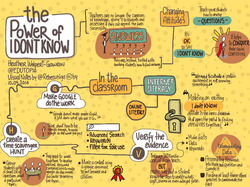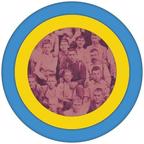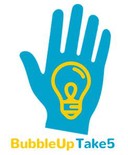 1. I first came across Health Wolpert-Gawron's post on Edutopia called The Power of I Don't Know via a fantastic sketchnote by Rebeca Zuñiga and the message resonated. I have long since valued the art of questioning and teaching students how to ask good questions, how to wonder and be curious. It is so important, as Wolpert-Gawron writes, to "cultivate a certain excitement in not knowing something." Wolpert-Gawron then goes on to offer a few ideas on emphasizing this power in her lessons on online literacy, but the true heart of this piece is turning "I don't know" on its head and bringing it into the classroom in a positive way. 2. With the concept of "I don't know" in mind, this post by Justin Birckbichler and Mari Venturino on titled Teachers Don't Have All the Answers discusses the philosophy behind BreakoutEDU Digital in which participants work together, problem solve and figure out clues. Justin and Mari, as the team behind BreakoutEDU Digital, don't offer the solutions to their game-based experiences; they challenge teachers to learn along side with their students, to problem solve together. This quote highlights that same power of I don't know: You were vulnerable with them. You shared your struggle. You modeled resiliency and a refuse to give up. You showed them that it's ok to ask for help; that it's ok to admit you don't always have all the answers. 3. As a middle school educator, a recent article in The New York Times titled Can Teenage Defiance be Manipulated for Good? held me captive. I love the idea of reframing the natural tendency of teenage defiance as a "power to be harnessed," encouraging students to take a stand on issues they deem important. The research highlighted in this article indicates that when teenagers connect learning to a higher cause, it makes a much bigger impact. This quote from educator Ron Berger gets to the heart of the piece: “Adolescents have this craziness that we can criticize — or we can tap into...this is a time in their lives when justice matters, more than any other time.”  4. Podcasts are my jam. If you've been with BubbleUp for a bit, I listed some of my favorite podcasts in our first Take5 post. A recent new discovery is the lovely show called The Memory Palace by Nate DiMeo. DiMeo has a background in public radio and is an expert storyteller; he brings moments in history to life in short snippets with episodes that are, on average, about 14 minutes long, many of which could bring valuable insight into a history classroom. I think you should start where I began with episode 94, Numbers which touches on the draft lottery during the Vietnam War. 5. And finally, as my co-librarian and I begin to collaborate with teachers to help structure project-based learning experiences for our students this year, the article 8 Basic Steps of Project-Based Learning to Get Your Started by Drew Perkins of TeachThought PD offers a clear step-by-step outline of how to plan for PBL, complete with an infographic and video explanation. What has you thinking this week? We would love to hear from you! Gretchen You might also like:
0 Comments
Your comment will be posted after it is approved.
Leave a Reply. |
Who We Are
Join our list!Archives
September 2020
Categories
All
|







 RSS Feed
RSS Feed